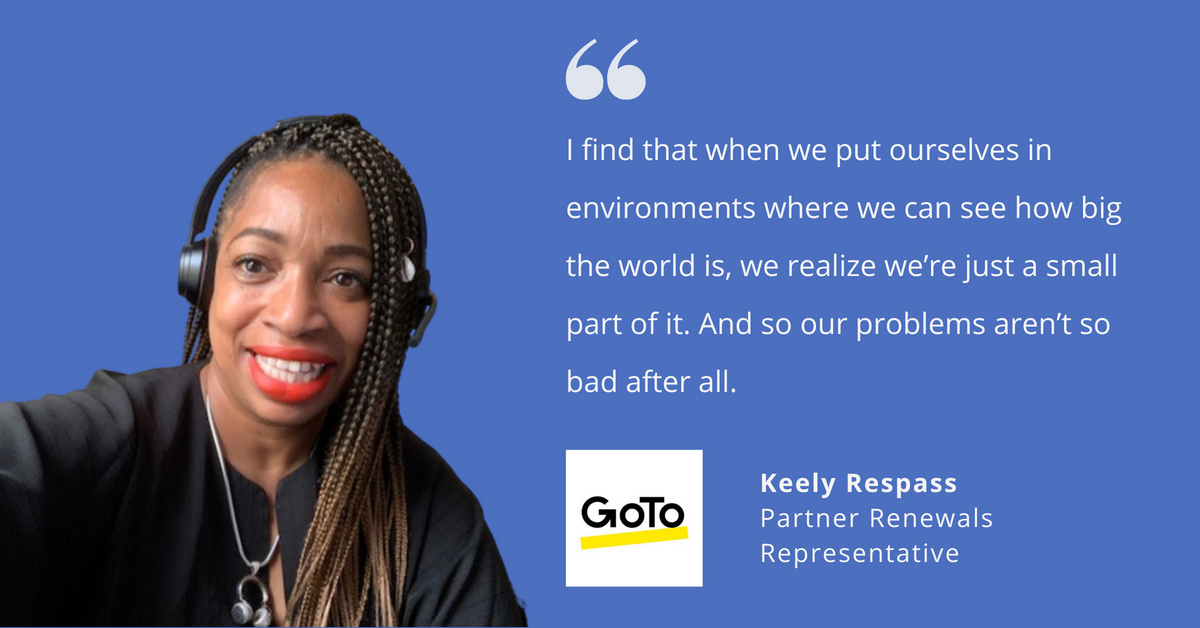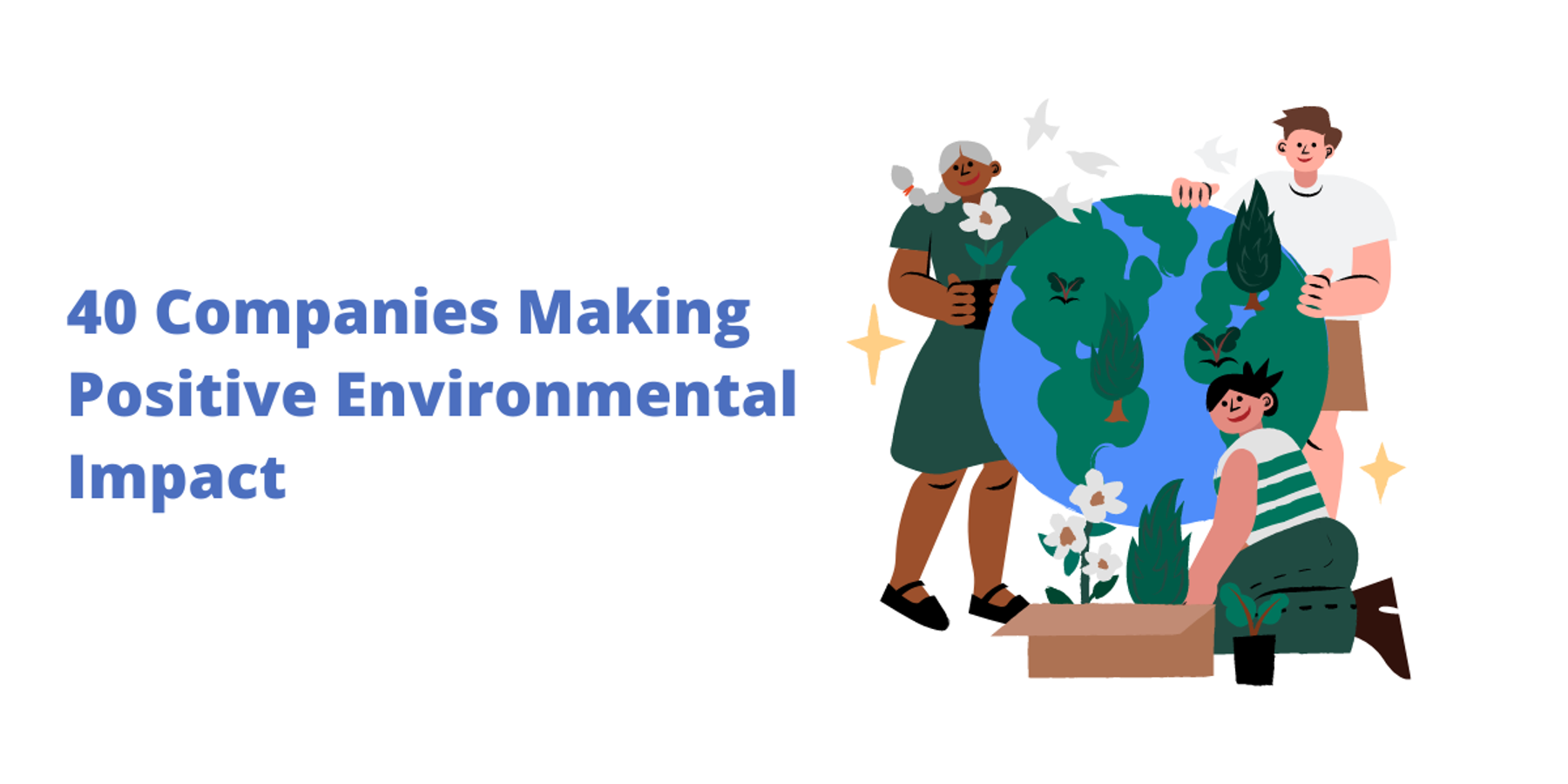The Hudson River is Keely Respass’ sanctuary.
When she’s feeling overwhelmed, Keely puts in her headphones, selects her favorite playlist, and strolls along its winding walkway.
“I think we have this tendency to get caught up in our own thoughts,” Keely shares. “The Hudson River helps me maintain a sense of balance and know that everything is going to be okay.”
Not only does each step bring her peace, but it also serves as a metaphor for how she tackles tasks in her everyday life. Keely believes in the importance of momentum. No matter how large or overwhelming a task may feel, just take one small step forward. Then another, and another.
“I always quote, ‘It’s one step at a time that we complete the million-mile journey,’” Keely says.
This momentum led the Brooklyn native through a myriad of careers and priorities, from film school to the sports industry and, eventually, to the technology space. Now, as a partner renewals representative at GoTo, the flexible-work software provider, Keely continues to tackle competing responsibilities with a positive mindset and grounded perspective.
We sat down with Keely to hear exactly how she balances priorities, both in work and her personal life — and we asked her to share four of her best tips for how you can do the same.
The One Constant Is Change
Keely jokes that she is everyone’s go-to person when they need help.
“I’m always amazed at how many people reach out to me for things,” Keely laughs. “Regardless, I want to be there, whether it’s finding a job reference for a friend or running a mock phone interview for their kid.”
Once you get a sense of Keely’s broad skillset and doer attitude, it’s no surprise that she’s at the top of people’s call list. Keely’s career path led her through multiple industries where she learned to manage varying responsibilities and pivot tasks.
It started with her film degree, which didn’t exactly go as expected. Upon graduation, Keely realized that the corporate side of film wasn’t for her and instead landed a job at Madison Square Garden as an administrative assistant. From there, she pivoted to directing internal programs at an organization for economically disadvantaged youth.
“I did that for a little over a year, and then realized it still wasn’t enough of a challenge for me. I’m always pushing myself — wondering, ‘what’s next?’” shares Keely. This time around, “next” led Keely to GoTo, formerly known as LogMeIn.
“I’ve been with the company through multiple evolutions and brandings, and I’ve also gone through multiple positions myself,” she shares. From office manager to event producer to her current role as partner renewals representative, the one constant for Keely is change.
“One of the wonderful things that I’m able to bring to this team is the fact that I’ve been around — I can handle so many environments,” Keely says.
So, how does she balance it all?
“First, take a deep breath,” Keely says, laughing, and then proceeds to share the secrets to her success.
Calendars, Lists, and Long Walks
“For me, it starts at night,” Keely shares in regard to how she prioritizes her tasks.
“After logging off, I think about what I completed that day and what still needs to be done. I move from big to small. Have the large customers been taken care of? What’s still pending, and how can I accomplish that tomorrow?”
Keely swears by her calendar. She writes everything down, builds out her lists, and reshuffles tasks when new assignments come up. The same goes for personal responsibilities. If she’s too busy this week, she finds a place next week. No matter what, each item finds its place to ensure it’s not forgotten.
“At the end of each week, I like being able to see exactly what I accomplished. It motivates me,” she shares.
Keely — like all of us — also has those weeks that feel insurmountable, where she's being inundated with a seemingly endless series of requests and projects.
It’s these moments that bring her back to the Hudson River. Keely emphasizes the importance of taking a step back and going on that nature walk — or whatever your outlet may be.
“We sometimes feel this pressure when we’re looking at a big project. It’s like we’re paralyzed and don’t know where to start. I find that when we put ourselves in environments where we can see how big the world is, we realize we’re just a small part of it. And so our problems aren’t so bad after all,” Keely shares.
With a fresh mind, Keely is able to return to her computer and take the first step. After the first comes the second, and before she knows it, she’s completed the daunting task.
Grounding herself in nature also helps Keely to go easy on herself when she doesn’t accomplish everything. “I tell myself, ‘Keely, it’s not that serious. Bring yourself back down to earth.’”
The Power of “No”
Another one of Keely’s superpowers as she’s prioritizing tasks is the word “no.”
She recognizes that it’s often difficult to reject someone’s request, and as professionals, we’re conditioned to feel guilty when we’re not helping.
To combat this feeling, Keely taps into her childlike self. Literally.
“Little children have this wonderful ability to say ‘no’ when they don’t want something. And not only do they say the word easily, but everyone respects it. I thought to myself, why don’t adults accept each others’ ‘no’? We should, so I decided I would start saying it.” Keely shares.
Fortunately, Keely works in a culture that respects her no.
“We’re big on mental health here at GoTo. I can go to my manager and say, ‘Hey, I’m maxed out right now. I need to take a step back,’ and she doesn’t question it,” Keely says.
GoTo also closes its virtual offices on the first Friday of each month to give people a self-care day. To ensure people log off and take care of themselves, team members will post photos the following Monday showing how they spent the day offline, from long hikes to family time.
“Plus, when you’re on PTO, people truly respect your time off. If an emergency comes up at work and you have to be online, you’ll receive an extra day off to get that time back,” confirms Keely.
It’s thanks to these resources that Keely feels safe vocalizing her bandwidth. If she needs to take a walk, she can. And when she’s ready to work, she comes back with vigor.
4 Tips for Balancing Priorities
While long nature walks and robust calendars work for Keely, they might not be your preferred techniques for balancing priorities.
So, what strategy will work for you?
Keely shares four universal tips to help you tackle competing tasks, no matter your interests:
- Take a deep breath. “Remember, progress happens one step at a time. If you’re someone who thrives under pressure, fantastic. But either way, breathe. Take your time,” says Keely.
- Know when to say no. “When you’re maxed out, you’re maxed out. There’s no shame in that,” shares Keely. She also highlights the importance of recognizing what responsibilities interest you, and which don’t. “Ask yourself: is this working for me? And if it’s not, that’s okay. Say no. Think about what better serves you,” shares Keely.
- Ask for help. “When I’m working on a new project, I’ll often message my manager every step of the way to ensure I’m on the right track. I ask for guidance,” shares Keely. This also means leaning on your team when you’re too strapped to take on a project.
- Admit when you messed up. When we’re balancing multiple priorities, sometimes we make mistakes. We forget a page of a project, we miscalculate a formula, we miss a call. In Keely’s eyes, that’s okay. “No matter what, it’s so important for us to own our mistakes. Learn from them. And then move on,” shares Keely.
At the end of the day, Keely believes that balancing priorities well allows her to achieve a bigger goal in life: finding time to give back.
“We’re on this planet together. We have to take care of each other. Whether it’s reading to children or serving food at your local shelter, find a couple of hours a week to give back,” Keely shares.
“Simply put, balance your priorities so you can make time for others.”
Interested in working for a company that helps you find time for what matters most to you? Check out GoTo’s job openings here.




